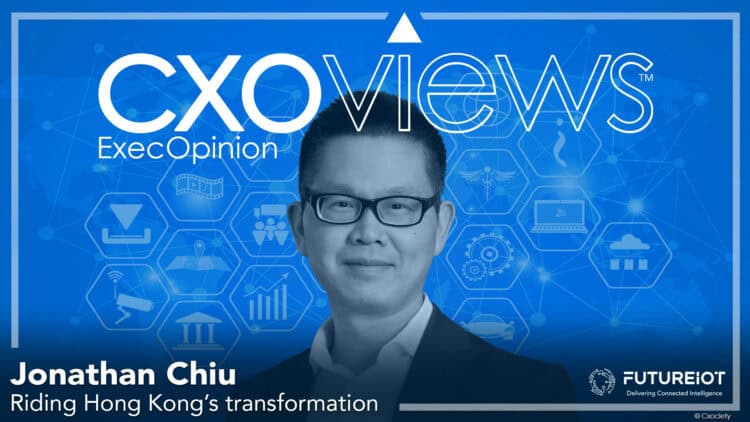As the world grapples with the impact of climate change, the need for sustainable urban development has never been more pressing, especially in the rapidly developing regions of Asia. This rapid urbanisation, if not managed properly, can exacerbate issues like pollution, energy consumption, and greenhouse gas emissions – all of which contribute to climate change.
The rise of "smart cities" offers a promising solution. By leveraging advanced technologies like the Internet of Things, big data analytics, and renewable energy, smart cities have the potential to significantly reduce a city’s environmental footprint while improving the quality of life for residents.
In Hong Kong, the city showcases a stark dichotomy between old and modern buildings. Jonathan Chiu, president of Schneider Electric Hong Kong, says that by 2030, nearly 30% of the 50,000 buildings will be over 50 years old, and deemed outdated.
“In contrast, newer buildings constructed in the last 10 to 15 years boast advanced and efficient features,” he points out. “Property developers are actively integrating green technologies and AI to develop intelligent buildings. The government's fervently promoting green certifications and incentives for green upgrades strongly propels the evolution of smart buildings in Hong Kong.”
The economics of building operation
The paper, Improving building performance using smart building concept: Benefit cost ratio comparison, reveals that smart buildings are 25% more expensive to put together than conventional ones. However, over a 30-year operating period, smart buildings generate lower operational and maintenance costs by as much as 38%.
Chiu says: “I believe the most expensive aspect is the construction of green-friendly, energy-efficient, and sustainable buildings, which are cheaper to operate.” He explains that in terms of operating costs, smart and green buildings are more energy-efficient and automated. They are more efficient in conserving energy.
“If we compare them to buildings constructed 20 or 30 years ago, the older buildings may lack advanced building management systems and optimisation capabilities,” he adds. “They are still very manual and lack visibility into energy consumption.

“There are numerous methods and technologies available to improve the efficiency of these older buildings. That's why the industry focuses on retrofitting and retro-commissioning, aiming to transform these old buildings into more efficient ones. In terms of operating costs, new buildings are undoubtedly more efficient and cost-effective.”
Jonathan Chiu
Modernisation – the story behind smart city development
The modernisation of the construction industry plays a pivotal role in the development of smart cities, as it enables the creation of more efficient, sustainable, and technologically advanced urban environments.
Enabling the modernisation of buildings and cities are technologies like the Internet of Things (IoT), Building Information Modelling (BIM) solutions, and approaches like digital twins.
Chiu points out that the adoption of BIM solutions is a form of change management adding that although some people may still use Excel or AutoCAD, there are two drivers behind the increasing use of BIM solutions in Hong Kong.
“The first driver is the Hong Kong government and Construction Industry Council, who are actively promoting the use of BIM solutions in construction projects. Many projects now mandate the use of BIM solutions.
“The second driver is the developers and construction companies themselves, who are more open to embracing these solutions because they appreciate the cost savings and improved project management,” he continues.
He opines that the traditional way of designing buildings often results in data loss after project completion. He concedes that this data cannot be reused during the construction or operation and maintenance phases.
He explains that BIM solutions offer a connected platform that allows for seamless transfer and reuse of data across all phases of the building lifecycle. “This is particularly important for facility managers who rely on this data for effective building management,” he stressed.
Hong Kong – beyond its smart city initiatives
Hong Kong’s Climate Action Plan 2050 sets a target for the city to achieve carbon neutrality before 2050. The plan relies on four key strategies to reach this goal:
The first is transitioning to net-zero electricity generation by utilising renewable energy sources, nuclear power, and hydrogen.
The second strategy focuses on energy savings and green building practices, both in new construction and through retrofitting existing buildings.
The third strategy is to drive the adoption of electric vehicles in Hong Kong.
Finally, the plan includes initiatives to reduce waste generation and promote sustainable waste management, which aligns with the broader goals of smart city development in the city.
These four strategies - net-zero electricity, energy-efficient buildings, green transportation, and waste reduction - form the core of Hong Kong's Climate Action Plan 2050. Chiu says “The plan demonstrates the government's commitment to addressing climate change and transitioning the city towards a more sustainable and carbon-neutral future, with the smart city initiatives playing a key supporting role in achieving these environmental goals.”
Role of enterprises in sustainable smart cities
Asked How should enterprises integrate smart technologies with modernisation efforts and do so sustainably, Chiu believes that integration is relatively straightforward because the technology is already available.
He cites the leveraging of IoT and digital solutions to make companies and buildings smarter. He points out that the technology itself is not a major issue. “It's more about the mindset,” he opines.
“People need to be more open-minded towards new technologies and make bolder decisions regarding investments in green technologies,” he elaborates. Proclaiming it important, he posits that government incentives play a significant role as a driver. “When people invest in green tech, they receive sponsorship from the government, which serves as a good motivator for developers,” he observes.
He also stresses that collaboration between different stakeholders and parties is essential. “Nowadays, many companies, enterprises, and developers are already looking into Scope 3 emissions,” he adds. “While they can directly control Scope 1 and Scope 2 emissions by reducing energy consumption or using green energy, Scope 3 emissions require collaboration with upstream suppliers or downstream customers.
He submits that this change is necessary to ensure the achievement of a net-zero supply chain. “Collaboration, therefore, becomes a key element,” he concludes.



